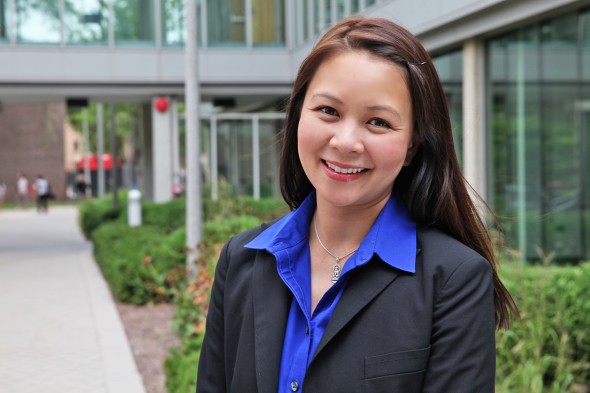Show kids the money?

“Kids who handle money work harder, but there’s a downside — the same hardworking kids help less, take more and donate less,” says Lan Chaplin, associate professor of marketing, who conducted studies on children ages 3 to 6.
You can get more effort out of kids who get their hands on a little money.
But you’ll find them less willing to give and more willing to take than tots who didn’t touch the dough.
Those are among the findings of a study by Lan Chaplin, associate professor of marketing, and four other researchers.
“Kids who handle money work harder,” Chaplin said, “but there’s a downside — the same hardworking kids help and donate less, but take more.”
The researchers conducted six studies with 550 children ages 3 to 6 — most from Poland and the rest from a large metropolitan area on the East Coast.
For each study, children were separated into two groups. One group was asked to sort money and the other to sort buttons or candy. Each group was then asked to complete challenging tasks like a jigsaw puzzle or maze.
In one experiment, the researchers found that 73 percent of the preschoolers who handled money spent at least two minutes on a puzzle. Of the button handlers, only 56 percent gave it that much time.
In a second experiment, the kids were asked to help prepare a task for another child that involved gathering crayons.
The ones who sorted money were less helpful at the chore.
Another study added candy to the mix. After sorting candy, money or buttons, the youngsters were allowed to take up to six Disney stickers.
Everyone who handled money took at least three stickers, while only 78 percent of the candy sorters and 76 percent of the button sorters took that many.
Then they were told they could give some of their stickers to kids who didn’t participate. The money handlers gave away only half as many stickers as the candy and button handlers.
The denomination of the money made no difference. Also, there was no difference between the Polish and American kids.
“Money is a vital component of cultural life,” Chaplin said. “Our findings with children as young as three suggest potentially significant implications for achievement, generosity and interpersonal harmony.”
Other researchers have come up with similar results with adults in Europe, Asia and North America.
“We wondered if the effects found in all the adult studies were due to adults’ knowledge of the value of money,” Chaplin said. “So we studied children who have very little knowledge of money, and we found the same effects.”
The study, “Money Cues Increase Agency and Decrease Prosociality Among Children: Early Signs of Market Mode Behaviors,” will appear in the journal Psychological Science.
Co-authors with Chaplin are Kathleen Vohs of the University of Minnesota; Agata Gasiorowska and Tomasz Zaleskiewicz, both of the University of Social Sciences and Humanities in Warsaw, Poland; and Sandra Wygrab of the Center of Research in Economic Behavior in Warsaw.
Chaplin was co-winner of the ACR Sheth Foundation Dissertation Competition for Public Purpose Research in 2002. Her topic: the development of materialism in children and adolescents.
Her maiden name, Nguyen, indicates her Vietnamese heritage, but she grew up in Philadelphia. She earned a bachelor’s degree in biological basis of behavior from the University of Pennsylvania and a Ph.D. in business administration from the University of Minnesota.
Chaplin was a lecturer in marketing at Minnesota from 2000 to 2002; an assistant professor of marketing at UIUC from 2003 to 2007, at the University of Arizona from 2008 to 2010, and at Villanova University from 2010 to 2013; and an associate professor of marketing at Villanova in 2013. She started at UIC in 2013.
She lives in Winnetka with her husband, Brian Chaplin, a professor of chemical engineering at UIC, their son, Willhelm Thai, 10, and their daughter, Amara Thi, 6.
Most of her research involves children.
“I’m interested in anything related to how kids learn about the marketplace — so anything from what they know about money to why they value material goods more than experiences,” Chaplin said.
“What they know about products and brands blows my mind.”
Categories
